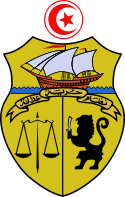- Constitution of Tunisia
-
Tunisia 
This article is part of the series:
Politics and government of
TunisiaConstitution- Constitution
- Constituent Assembly
Executive- Acting President (List)
- Fouad Mebazaa
- Prime Minister
- Beji Caid el Sebsi
- Cabinet
JudiciaryDivisionsElections- Elections: 2009, 2011
- Political parties
Foreign relations
The Constitution of Tunisia is the supreme law of the Tunisian Republic. The Constitution is the framework for the organization of the Tunisian government and for the relationship of the federal government with the governates, citizens, and all people within Tunisia. It was adopted on 1 June 1959 and amended in 1988 and 2002, after the Tunisian constitutional referendum of 2002.
Role of Articles 56 and 57 during the 2011 presidential transition
During the Tunisian revolution, President Zine El Abidine Ben Ali left Tunisia on 14 January 2011[1][2] and Prime Minister Mohamed Ghannouchi stated that he became the acting President under Article 56 of the Constitution.[3][4] Al Jazeera claimed that lawyers disagreed with Ghannouchi's claim, since under Article 57 of the Constitution of Tunisia, the Constitutional Council should meet and the leader of one of the houses of the Tunisian parliament should become an interim President.[5] The Constitutional Council declared that "the post of president is definitely vacant" and declared that under Article 57, Fouad Mebazaa should become the interim President, with the obligation to call for elections within 45 to 60 days.[6] On 15 January 2011, Mebazaa was officially sworn in as interim President.[6]
References
- ^ "Tunisia: President Zine al-Abidine Ben Ali forced out". BBC News. 15 January 2011. http://www.bbc.co.uk/news/world-africa-12195025. Retrieved 26 October 2011.
- ^ Chrisafis, Angelique; Black, Ian (15 January 2011). "Zine al-Abidine Ben Ali forced to flee Tunisia as protesters claim victory". The Guardian. http://www.guardian.co.uk/world/2011/jan/14/tunisian-president-flees-country-protests. Retrieved 26 October 2011.
- ^ "Ben Ali quits after 23 yrs in power & leaves Tunisia". Al Arabiya. 14 January 2011. http://www.alarabiya.net/articles/2011/01/14/133432.html. Retrieved 26 October 2011.
- ^ "PM replaces Tunisia president". Al Jazeera English. 15 January 2011. http://english.aljazeera.net/news/africa/2011/01/2011114172228117723.html. Retrieved 26 October 2011.
- ^ "Constitutional debate". Al Jazeera English. 14 January 2011. Archived from the original on 14 January 2011. http://english.aljazeera.net/news/africa/2011/01/2011114204942484776.html. Retrieved 26 October 2011.
- ^ a b "Tunisia swears in interim leader". Al Jazeera English. 16 January 2011. Archived from the original on 15 January 2011. http://english.aljazeera.net/news/africa/2011/01/201111513513854222.html. Retrieved 26 October 2011.
External links
Constitution of Africa Sovereign
states- Algeria
- Angola
- Benin
- Botswana
- Burkina Faso
- Burundi
- Cameroon
- Cape Verde
- Central African Republic
- Chad
- Comoros
- Democratic Republic of the Congo
- Republic of the Congo
- Côte d'Ivoire (Ivory Coast)
- Djibouti
- Egypt
- Equatorial Guinea
- Eritrea
- Ethiopia
- Gabon
- The Gambia
- Ghana
- Guinea
- Guinea-Bissau
- Kenya
- Lesotho
- Liberia
- Libya
- Madagascar
- Malawi
- Mali
- Mauritania
- Mauritius
- Morocco
- Mozambique
- Namibia
- Niger
- Nigeria
- Rwanda
- São Tomé and Príncipe
- Senegal
- Seychelles
- Sierra Leone
- Somalia
- South Africa
- South Sudan
- Sudan
- Swaziland
- Tanzania
- Togo
- Tunisia
- Uganda
- Zambia
- Zimbabwe
States with limited
recognitionDependencies and
other territories- Canary Islands / Ceuta / Melilla / Plazas de soberanía (Spain)
- Madeira (Portugal)
- Mayotte / Réunion (France)
- Saint Helena / Ascension Island / Tristan da Cunha (United Kingdom)
- Western Sahara
Categories:- 1959 in Tunisia
- Constitutions by country
- Politics of Tunisia
- Tunisia stubs
Wikimedia Foundation. 2010.
